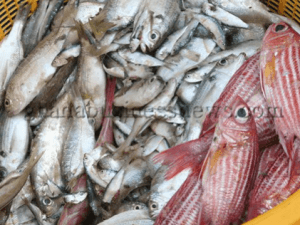University of Cape Coast, fisherfolks dialogue on Sustainable Fisheries and Coastal Management
 The Fisheries and Aquatic Sciences Department of the University of Cape Coast (UCC) on Wednesday engaged members of fishing communities in the Central Region in a dialogue on Sustainable fisheries and Coastal Management in the country.
The Fisheries and Aquatic Sciences Department of the University of Cape Coast (UCC) on Wednesday engaged members of fishing communities in the Central Region in a dialogue on Sustainable fisheries and Coastal Management in the country.
The workshop, which was on the theme “Developing tools for Sustainable Coastal Resources Management” brought together Chief Fishermen, Canoe Owners, Fishmongers and other stakeholders in fishing communities across the Region.
It was in line with series of policy and research dialogues being held under the $5.5 million United States Agency for International Development (USAID)/UCC Fisheries and Coastal Management Capacity Building Support Project.
Started in 2014, the project aims at strengthening capacity for sustainable fisheries and resource management and the improvement of infrastructure for training and research of fisheries and coastal management.
The University, as part of the project, is being supported to establish a Centre for Coastal Management as well as train 10 Doctor of Philosophy (PhD), 20 masters’ degree and 150 undergraduate students.
Dr. Dennis Aheto, Head of the Department and Project Manager, bemoaned the challenges that has plagued the country’s fisheries sector in recent times but stated that the University was working assiduously with the USAID and the Ministry of Fisheries and Aquaculture to change the status quo.
He called on members of the fishing communities to make conscious efforts to stop illegal fishing methods, which was depleting the fish stock and collaborate with the project to save the sector.
Dr. George Darpaah, Senior Lecturer, University of Ghana, and a facilitator of the project, noted that the objectives of the Project were to maximize sustainable biomass yield and economic yield, secure and increase employment, protein production, food supplies and export income.
However, he said, the achievement of these objectives had often been a source of conflicts since traditional fisheries management practices, supported by political arrangements have largely failed resulting in declining productivity, economic inefficiency, and depressed fisher incomes.
He said it was in the light of these environmental and fisheries management challenges that policy and research dialogues was needed to facilitate the sustainable management of fisheries and coastal zone of Ghana.
Dr. Darpaah therefore stressed the need for Fishermen- and fishmongers to lead in the enforcement of fisheries regulations and management of the coastal environment towards sustainable fisheries and environmental management.
Participants agreed there has been a constant decline in fish catch and decline in incomes, which was affecting them economically and therefore, lauded the project and pledged their support in saving the industry.
Ms. Rebecca Eshun, a fishmonger, during an open forum appealed to the Government to institute a special scholarship scheme akin to that of cocoa farmers, for children of fishermen and fishmongers.
This she said would improve education in fishing communities and help sustain the sector since the desire of some of their children was not only to join their family trade, but to pursue fisheries related courses at the tertiary level to enhance it.
Her appealed was lauded by many of the participants who opined that such a scheme was long overdue considering the contribution of the fishing communities to the fishing industry.
Source: GNA
